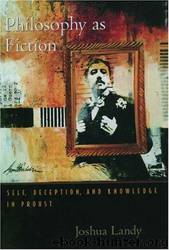Philosophy as Fiction: Self, Deception, and Knowledge in Proust by Joshua Landy

Author:Joshua Landy
Language: eng
Format: mobi, epub
Tags: Literary Studies, Amazon.com
ISBN: 0195169395
Publisher: Oxford University Press
Published: 2004-07-14T15:00:00+00:00
3. An Evolving Self: The Bio-Aesthetic
Proust may, however, be hinting at an even bolder solution. He may be suggesting, that is, that life in literature-necessitating, as it would, a fictional autobiography issued in an endless series of revised editions-is not a serious option, and that a second, more attractive possibility remains open. Yes, "life realised within the confines of a book" would be a wonderful thing (note the conditional mood Marcel uses throughout the relevant passage), but we do not have to go quite that far, since life itself is already literature (indicative mood), if one only knows how to see it. "Real life, life at last laid bare and illuminated-the only life in consequence which can be said to be really lived-is literature, and life thus defined is in a sense all the time immanent in ordinary men no less than in the artist. But most men do not see it because they do not seek to shed light upon it. And therefore their past is like a photographic darkroom encumbered with innumerable negatives which remain useless because the intellect has not developed them" (TR 298-99).
Real life, that is, is inherently literary, even for the inartistic, who are merely unaware of its existence at a subterranean level of themselves." In order to bring it into the light, we do not have to channel our life into writing: on the contrary, we need only introduce literature into our life, "developing" the various images that lie dormant in the mind and thus, in compliance with the Pindaric injunction invoked by Nietzsche and Marcel alike (GS 27o/SG 368), becoming who we are. For we are already a set of disparate elements; whether or not we then become a whole of which they are parts depends on the success of our attempts at self-unification, on the measure of artistry we import into our existence. Instead of life in literature, the ultimate answer turns out to be life as literature." Instead of the aesthetic biography, what one might term the bio-aesthetic.
And the key model here is not Marcel or even Charlus, as one might expect, but Odette-or rather Mme Swann, for it is in the later stages of her life (subsequent to her dame en rose, "Miss Sacripant," and Odette de Crecy phases) that she discovers, and invents, her personal style. "Odette had at length discovered, or invented, a physiognomy of her own, an unalterable `character,' a `style of beauty,' and on her uncoordinated features ... had now set this fixed type, as it were an immortal youthfulness," judges Marcel. "Odette's body seemed now to be cut out in a single silhouette wholly confined within a 'line' which ... was able to rectify, by a bold stroke, the errors of nature" (BG 264-65). So successful is she, in fact, that she is still immediately recognizable years later, unlike any other guest at the Guermantes matinee: "Only perhaps Mme de Forcheville ... had not changed" (TR 366-67).
The reason that Odette's achievement counts both as discovery and as invention hinges, as we saw earlier, on the two senses of the word "style.
Download
Philosophy as Fiction: Self, Deception, and Knowledge in Proust by Joshua Landy.epub
This site does not store any files on its server. We only index and link to content provided by other sites. Please contact the content providers to delete copyright contents if any and email us, we'll remove relevant links or contents immediately.
4 3 2 1: A Novel by Paul Auster(12375)
The handmaid's tale by Margaret Atwood(7757)
Giovanni's Room by James Baldwin(7326)
Asking the Right Questions: A Guide to Critical Thinking by M. Neil Browne & Stuart M. Keeley(5758)
Big Magic: Creative Living Beyond Fear by Elizabeth Gilbert(5754)
Ego Is the Enemy by Ryan Holiday(5413)
The Body: A Guide for Occupants by Bill Bryson(5080)
On Writing A Memoir of the Craft by Stephen King(4935)
Ken Follett - World without end by Ken Follett(4723)
Adulting by Kelly Williams Brown(4565)
Bluets by Maggie Nelson(4547)
Eat That Frog! by Brian Tracy(4525)
Guilty Pleasures by Laurell K Hamilton(4439)
The Poetry of Pablo Neruda by Pablo Neruda(4097)
Alive: The Story of the Andes Survivors by Piers Paul Read(4018)
White Noise - A Novel by Don DeLillo(4002)
Fingerprints of the Gods by Graham Hancock(3996)
The Book of Joy by Dalai Lama(3976)
The Bookshop by Penelope Fitzgerald(3844)
